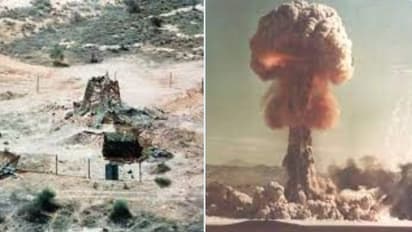India Untold: How 'Smiling Buddha' in 1974 changed India's nuclear future forever

Synopsis
On May 18, 1974, India entered the nuclear age with its first atomic test. The nuclear test caused strong international reactions.
May 18 stands out in history for two very different but powerful events—one that showed India’s rise as a nuclear power and the other, nature’s fury in the United States.
On this day in 1974, India tested its first nuclear bomb in Rajasthan, marking its entry into the nuclear club.
India’s nuclear debut: Smiling Buddha (1974)
On May 18, 1974, India carried out its first nuclear test in Pokhran, a desert region in Rajasthan.
The test was named "Smiling Buddha" and it marked India’s entry into the nuclear age, becoming the first country outside the five permanent members of the United Nations Security Council to develop nuclear weapons.
The science and politics behind the test
India’s nuclear journey began in the 1950s, with the formation of the Department of Atomic Energy in 1954 under Dr. Homi J. Bhabha. Initially, the focus was peaceful use of nuclear energy—such as for electricity and medicine. However, after China’s nuclear test in 1964 and the Nuclear Non-Proliferation Treaty (NPT) of 1968, India decided it needed to build its own nuclear strength.
India refused to sign the NPT, calling it discriminatory, as it allowed only five countries, namely the US, UK, Russia, France, and China, to keep their nuclear weapons, while banning others.
The explosion and its aftermath
On Buddha Purnima, a holy day in the Buddhist calendar, Indian scientists successfully carried out an underground nuclear test in Pokhran. The blast had an estimated yield of 10-15 kilotons of TNT.
After the test, Dr. Raja Ramanna, a key figure in India’s nuclear programme, reportedly informed Prime Minister Indira Gandhi with the now-famous words: “The Buddha has smiled.”
While India described it as a peaceful nuclear explosion (for civilian use like mining), it was clear to the world that India had become nuclear-capable.
Global reaction
The test caused strong international reactions:
- Canada cut nuclear cooperation, as the reactor used in the test had Canadian origins.
- The United States suspended all nuclear support to India.
- Pakistan, India’s neighbour, accelerated its own nuclear programme in response.
Some critics believed Indira Gandhi authorised the test to divert attention from domestic economic issues.
Despite criticism, the Pokhran test marked a turning point in India's global standing and set the stage for future nuclear development, including the more widely known Pokhran-II tests in 1998.
Stay updated with the Breaking News Today and Latest News from across India and around the world. Get real-time updates, in-depth analysis, and comprehensive coverage of India News, World News, Indian Defence News, Kerala News, and Karnataka News. From politics to current affairs, follow every major story as it unfolds. Get real-time updates from IMD on major cities weather forecasts, including Rain alerts, Cyclone warnings, and temperature trends. Download the Asianet News Official App from the Android Play Store and iPhone App Store for accurate and timely news updates anytime, anywhere.